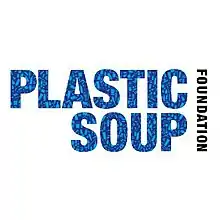Plastic Soup Foundation
Plastic Soup Foundation is a non-profit marine conservation organisation that aims to reduce plastic pollution.[1][2] Established in 2011, Plastic Soup Foundation advocates towards imposing bans and/or voluntary phase-outs of microbeads in cosmetics at a global scale with the Beat the Microbead campaign.[3][4]
 | |
| Formation | 2011 |
|---|---|
| Type | Non-governmental Organisation |
| Purpose | Marine conservation |
| Location | |
| Methods | Advocacy, Education, Innovation |
| Website | plasticsoupfoundation.org |
Projects
Beat the Microbead campaign
Initiated in 2012, the campaign has raised awareness and engaged people, cosmetic manufacturers and governing institutions on the issue of microbeads.[5][6][7] Since the campaign, 15 countries have taken steps to ban microbeads.[8][9] Beat the Microbead has introduced an app[10][11] that detects over 500 microplastic ingredients to be used as a tool by customers to recognize and avoid products containing microbeads, while also creating a database.[12] The project has introduced a "Zero Plastic Inside" logo to incentivize and recognize manufacturers who use eco-friendly alternatives to microbeads in their products.[13][14]
Ocean Clean Wash campaign
Since 2016, Ocean Clean Wash aims to reduce synthetic fiber pollution by 80% in the coming years by stimulating and promoting innovative solutions to microfiber filters[15] and exerting pressure on clothing and washing machine manufacturers to develop products that prevent the flow of fibers to the water systems.[16][17] The campaign has developed a new methodology and benchmark for fashion and textile brands to get their clothes tested for the amount of microfiber release whereby tested items will be assigned a label according to the release.[18][19]
Plastic Health Coalition
Plastic Soup Foundation initiated a partnership between national and environmental and research organisations to encourage further research into the human health impacts of plastic.[20][21][22][23]
Education
Plastic Soup Foundation has developed a scanning method called the Plastic Soup Footprint where companies can measure their plastic footprint.[24][25][26] The organisation holds inventor competitions to find innovation solutions for plastic pollution such as The Young Plastic Pollution Challenge.[27][28] The organisation also published teaching materials and conduct guest lecturers on plastic pollution in education institutes.[29]
See also
References
- beveragedaily.com. "Plastic Soup Foundation & VU University Amsterdam to analyse effects of microplastics". beveragedaily.com. Retrieved 2021-03-12.
- "Microplastic Soup: The State of Our Oceans". theecologist.org. Retrieved 2021-03-12.
- "Plastic Soup Foundation: UK microbeads ban first step to implementing plastic circular economy". edie.net. Retrieved 2021-03-12.
- Shackell, James (2021-02-14). "Down the tubes: should you brush your teeth with toothpaste tablets?". the Guardian. Retrieved 2021-03-12.
- "Nieuwe app om producten te testen op microplastics | Witte Weekblad Nieuw-Vennep | Nieuws uit de regio Nieuw-Vennep". www.witteweekbladnieuw-vennep.nl. Retrieved 2021-03-12.
- Harris, Kathleen. "Naturally . . . how to avoid microbead products". The Irish Times. Retrieved 2021-03-12.
- "Nederlanders omarmen massaal de Beat the Microbead-app om plastic te detecteren in cosmetica". Emerce (in Dutch). Retrieved 2021-03-12.
- "Plastic in make-up; Weet jij wat je op je huid en lippen smeert? | Houtens Nieuws | Nieuws uit de regio Houten". www.houtensnieuws.nl. Retrieved 2021-03-12.
- "In the name of beauty". Nature News. 525 (7570): 425. 2015-09-24. Bibcode:2015Natur.525Q.425.. doi:10.1038/525425a. PMID 26399790. S2CID 4468377.
- cosmeticsdesign-europe.com. "Latest app detects presence of plastic micro-beads". cosmeticsdesign-europe.com. Retrieved 2021-03-12.
- "Find Out if Your Facial Scrub Has Plastic Microbeads With New App". EcoWatch. 2014-01-09. Retrieved 2021-03-12.
- DuFault, Amy (2014-05-05). "The microbead battle and the search for a greener replacement". the Guardian. Retrieved 2021-03-12.
- "Microplastics, microbeads: What you did not know about self-care products". www.downtoearth.org.in. Retrieved 2021-03-12.
- "The Ocean Cleanup, Part 1: Alternatives to reduce ocean plastic | Deep Sea News". 2014-07-14. Retrieved 2021-03-12.
- Mark Tutton and Katie Pisa (2019-11-14). "Washing your clothes is causing plastic pollution, but a simple filter could help". CNN. Retrieved 2021-03-12.
- "Is my washing to blame for the plastic problem?". BBC News. 2018-10-06. Retrieved 2021-03-12.
- "Microfibres may stop lungs mending in COVID patients". www.innovationintextiles.com. Archived from the original on 5 January 2022. Retrieved 2021-03-12.
- Mowbray, John. "Danish Fashion Institute joins ocean plastic campaign". Ecotextile News. Retrieved 2021-03-12.
- News, Mirage (2021-03-08). "Plastic soup detectives analyse sources of beach litter in West Greenland and find it is of local origin | Mirage News". www.miragenews.com. Retrieved 2021-03-12.
{{cite web}}:|last=has generic name (help) - Neill, Pippa (2020-06-26). "Microplastics are contaminating fruit and veg". Environment Journal. Retrieved 2021-03-12.
- Reijmerink, Martin (2021-03-12). "Dagelijks ommetje benutten tijdens de Landelijke Opschoondag op 20 maart". De Digitale Stad Nieuwegein (in Dutch). Retrieved 2021-03-12.
- Straver, Frank (2021-02-15). "Bospaden worden verhard met plastic bouwafval". Trouw (in Dutch). Retrieved 2021-03-12.
- Foundation, Plastic Soup. "Children Exposed to Toxic Microplastics, Experts Warn in New Research by the Plastic Soup Foundation". www.prnewswire.co.uk. Retrieved 2021-03-12.
- "Industry activists: How superyacht companies are helping save the oceans". www.boatinternational.com. Retrieved 2021-03-12.
- Valenti, Lauren (22 April 2019). "5 Big Beauty Brands That Are Tackling the Industry's Plastic Problem". Vogue. Retrieved 2021-03-12.
- Kraaijenbrink, Jeroen. "How This Dutch Startup Plans To Disrupt The Supermarket Landscape". Forbes. Retrieved 2021-03-12.
- "Amsterdam has a bubble barrier to catch canal plastic". World Economic Forum. Retrieved 2021-03-12.
- "There's a single-use plastic you throw away without realising". World Economic Forum. Retrieved 2021-03-12.
- "Plastic in je crème: zo verweven zijn de chemische en cosmetische industrie". NU (in Dutch). 2020-11-09. Retrieved 2021-03-12.